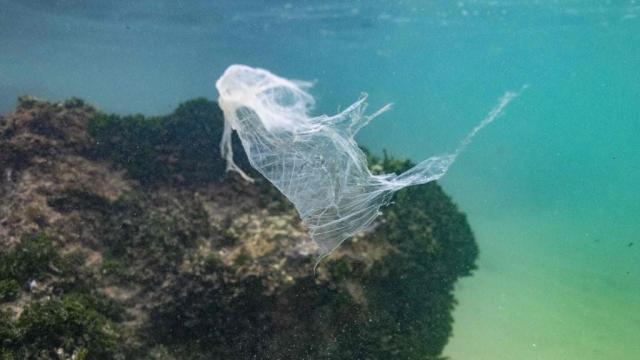It’s easy to hate plastic recycling in the U.S. — even for the most conscious consumer.
It’s not because we don’t think there should be a circular economy that would reroute plastic items away from landfills. It’s because the U.S. recycling system is broken and complicated. According to a new analysis, we are recycling less than we ever have.
Since the 1970s, oil companies have known that recycling wasn’t a real solution to reducing plastic waste. But they heavily promoted the message that individual choices to recycle mattered, because higher demand for plastic means more profits for Big Oil. Companies are still pushing the lie that recycling can solve the plastics crisis (Bill Nye is even helping), and our oceans continue to fill with trash.
Now there’s more evidence that our recycling system is ineffective. This week, Beyond Plastics, a nationwide project in Bennington College working to eliminate plastic pollution, and environmental nonprofit Last Beach Cleanup reported that the U.S.’s already measly rate of recycling has decreased in the last few years. According to their analysis, hardly any plastic waste was recycled last year.
The organisations collected data from the National Academy of Sciences, which found that only about 6% of plastic items were recycled in 2021. That’s down from the 8.7% reported by the EPA back in 2018. And that low rate isn’t just the result of consumers being lazy: Even when we put all our items in the proper bins, more than 80% of that plastic will go to a landfill, while about 11% will be incinerated, the report found.
“Consumers are understandably confused,” Judith Enck, the president of Beyond Plastics, said in an interview with Earther. “They see the recycling logo, so they put the plastic packaging in their recycling bin. Over 90% of plastics never get recycled.”
Plastic is notoriously difficult to recycle in the U.S., even though it’s literally everywhere. According to the EPA, as of 2018, the average American used more than 91 kg of plastic a year. That’s a “263% total increase” from the average person using 27 kg a year in 1980, the Beyond Plastics’ report says. Some of these items are indeed recyclable (albeit less than we’re led to believe): Enck said that PET plastic bottles, labelled #1 in the looping arrows symbol, are one of the few items that are actually recycled. But many other plastics don’t end up in a circular economy, no matter how well we sort and dispose of them.
Jan Dell, the founder of the Last Beach Cleanup, told The Guardian that the country doesn’t really have the facilities to process our plastic waste. We used to outsource our plastics to other countries, but that changed after China banned U.S. plastic imports back in 2017. We were never prepared to deal with the volume of our plastic waste. “We don’t have factories to do it. It’s also very water intensive, so we’re not going to build more plastic recycling facilities in the U.S.,” she said.
According to Enck, there’s not a one-size-fits-all solution, but policies that hold big plastic producers accountable will go a long way, as will bans on single-use plastics. Thankfully, some places are actually making good moves: In 2021, Maine passed a law that obligates companies to recycle their own waste instead of passing that duty on to the consumer.
“We need new laws on the books that reduce the amount of plastic packaging,” Enck said. “Because these companies are not going to reduce enough on their own, and consumers are left with little choices.”
